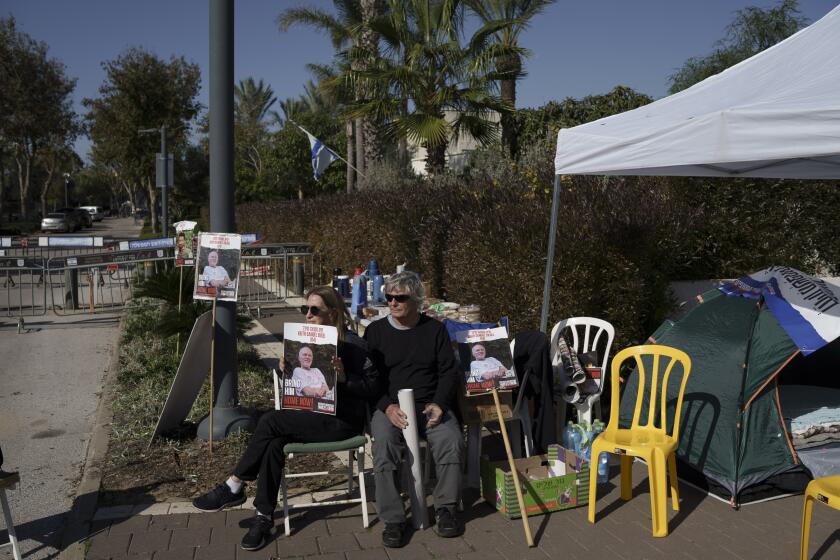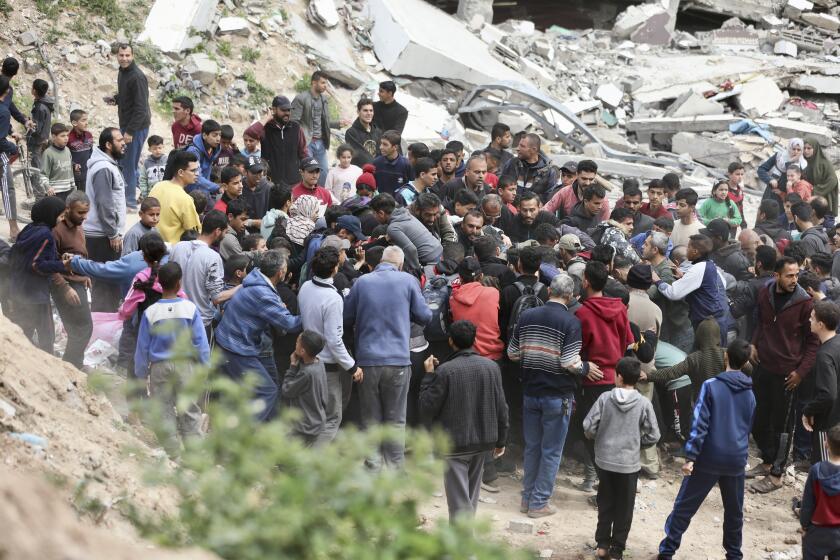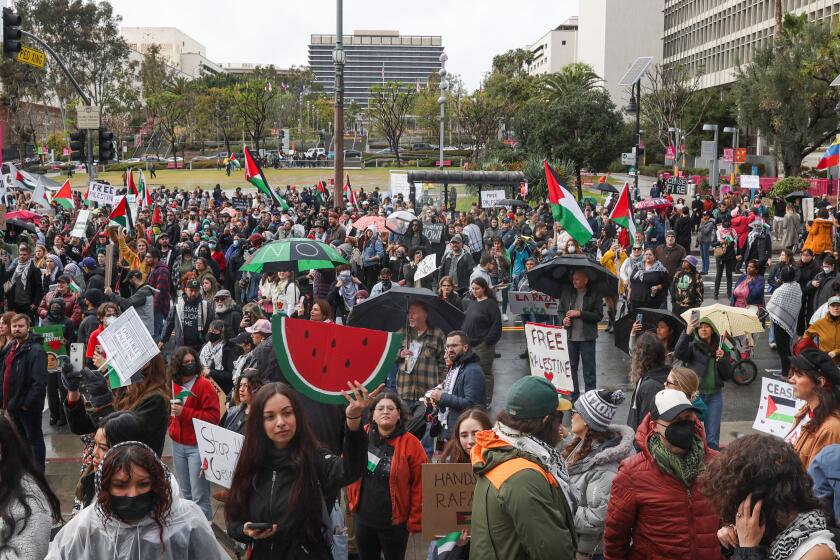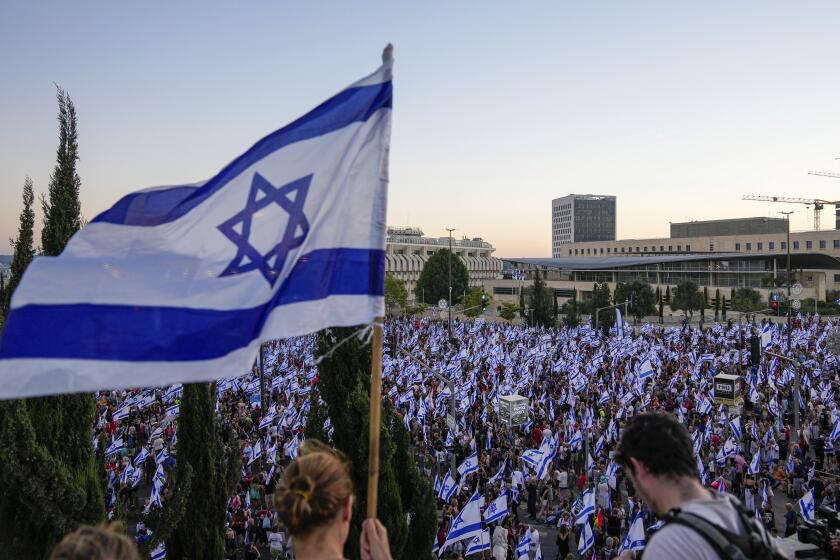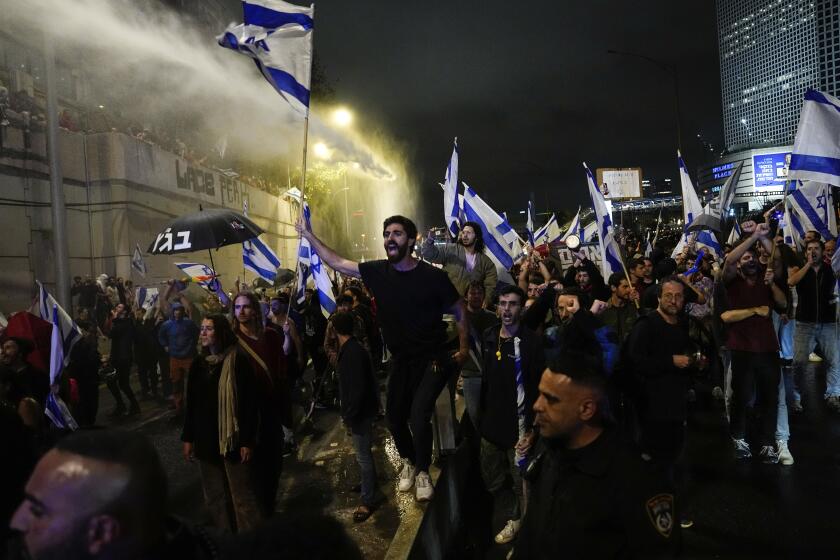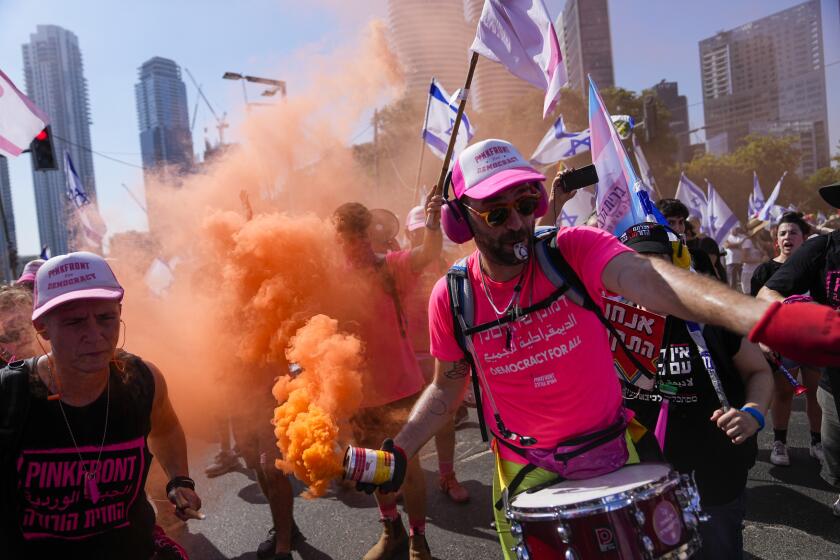Israelis stage largest protest since war began to increase pressure on Netanyahu
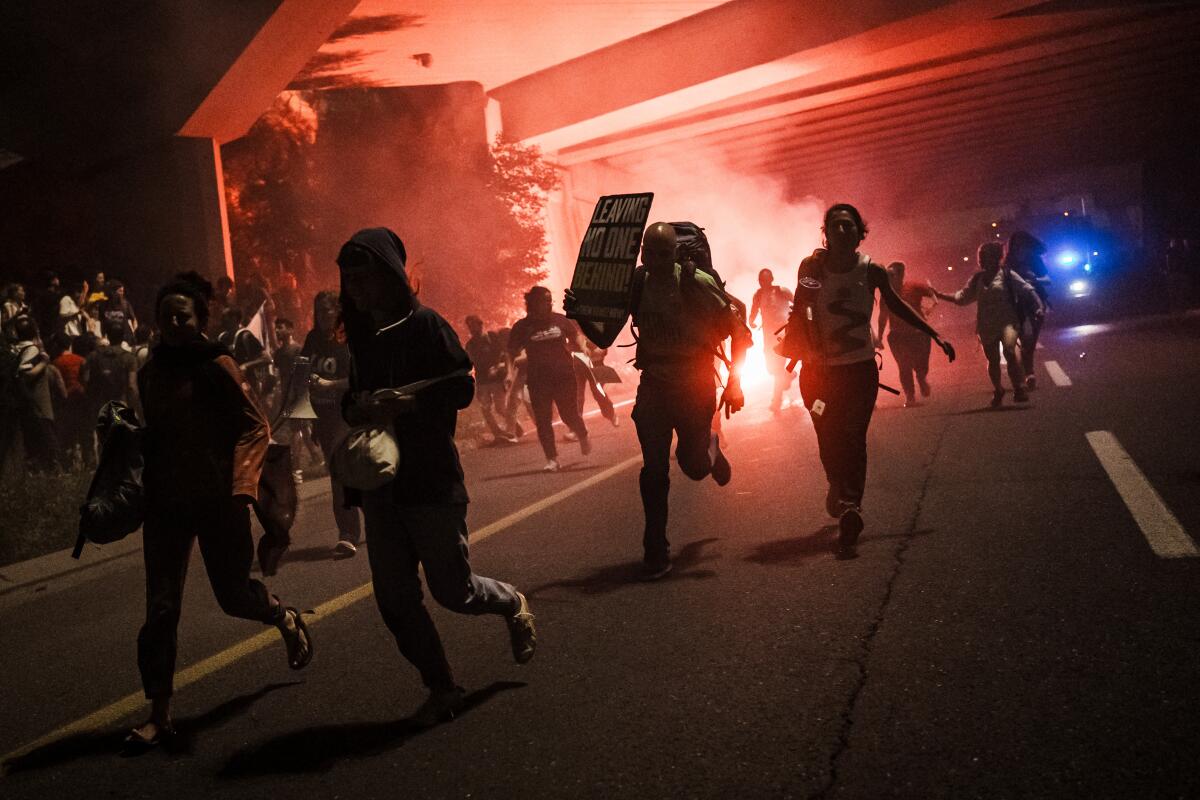
- Share via
JERUSALEM — Tens of thousands of Israelis thronged central Jerusalem on Sunday in the largest anti-government protest since the country went to war in October. Protesters urged the government to reach a cease-fire deal to free dozens of hostages held in Gaza by Hamas militants and to hold early elections.
Israeli society was broadly united immediately after Oct. 7, when Hamas killed about 1,200 people during a cross-border attack and took about 240 others hostage. Nearly six months of conflict have renewed divisions over the leadership of Prime Minister Benjamin Netanyahu, though the country remains largely in favor of the war.
Netanyahu has vowed to destroy Hamas and bring all the hostages home, yet those goals have been elusive. While Hamas has suffered heavy losses, it remains intact.
Roughly half the hostages in Gaza were released during a weeklong cease-fire in November. But attempts by international mediators to bring home the remaining hostages have failed. Talks resumed Sunday with no signs that a breakthrough was imminent.
Hostages’ families believe time is running out, and they are getting more vocal about their displeasure with Netanyahu.
Rrelatives of Israeli hostages held by Hamas militants in the Gaza Strip protested outside the home of Israeli Prime Minister Benjamin Netanyahu.
“We believe that no hostages will come back with this government because they’re busy putting sticks in the wheels of negotiations for the hostages,” said Boaz Atzili, whose cousin, Aviv, and his wife, Liat, were kidnapped Oct. 7. Liat was released but Aviv was killed, and his body is in Gaza. “Netanyahu is only working in his private interests.”
Protesters blame Netanyahu for the failures of Oct. 7 and say the deep political divisions over his attempted judicial overhaul last year weakened Israel ahead of the attack. Some accuse him of damaging relations with the United States, Israel’s most important ally.
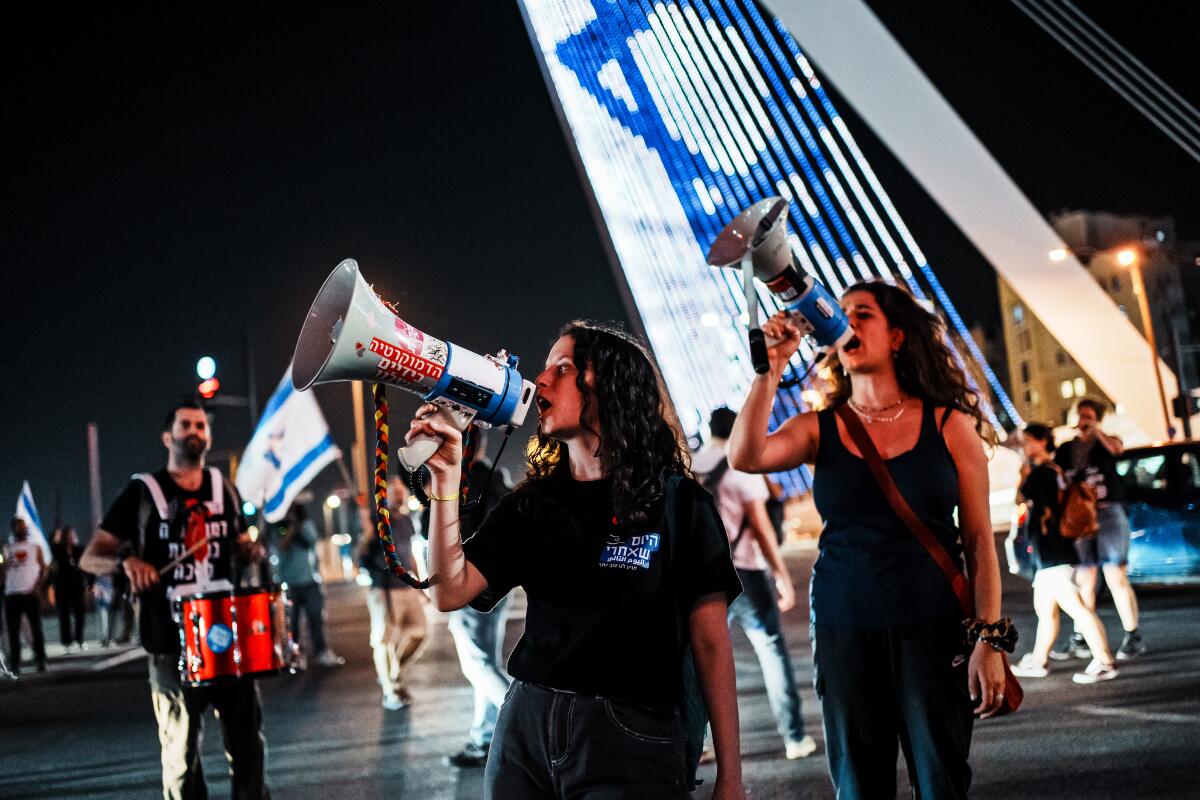
Netanyahu is also facing a litany of corruption charges that are slowly making their way through the courts, and critics say his decisions appear to be focused on political survival over the national interest. Opinion polls show Netanyahu and his coalition trailing far behind their rivals if elections were held today.
Unless his governing coalition falls apart sooner, Netanyahu won’t face elections until spring 2026.
Israeli Prime Minister Benjamin Netanyahu is railing against international criticism of his government amid the devastating war with Hamas.
Many families of hostages had refrained from publicly denouncing Netanyahu to avoid antagonizing the leadership and making the hostages’ plight a political issue. But as their anger grows, some now want to change course — and they played a major role in Sunday’s antigovernment protest.
The crowd on Sunday stretched for blocks around the Knesset, or parliament, and organizers vowed to continue the demonstration for several days. They urged the government to hold new elections nearly two years ahead of schedule. Thousands also demonstrated Sunday in Tel Aviv, where there was a large protest the night before.
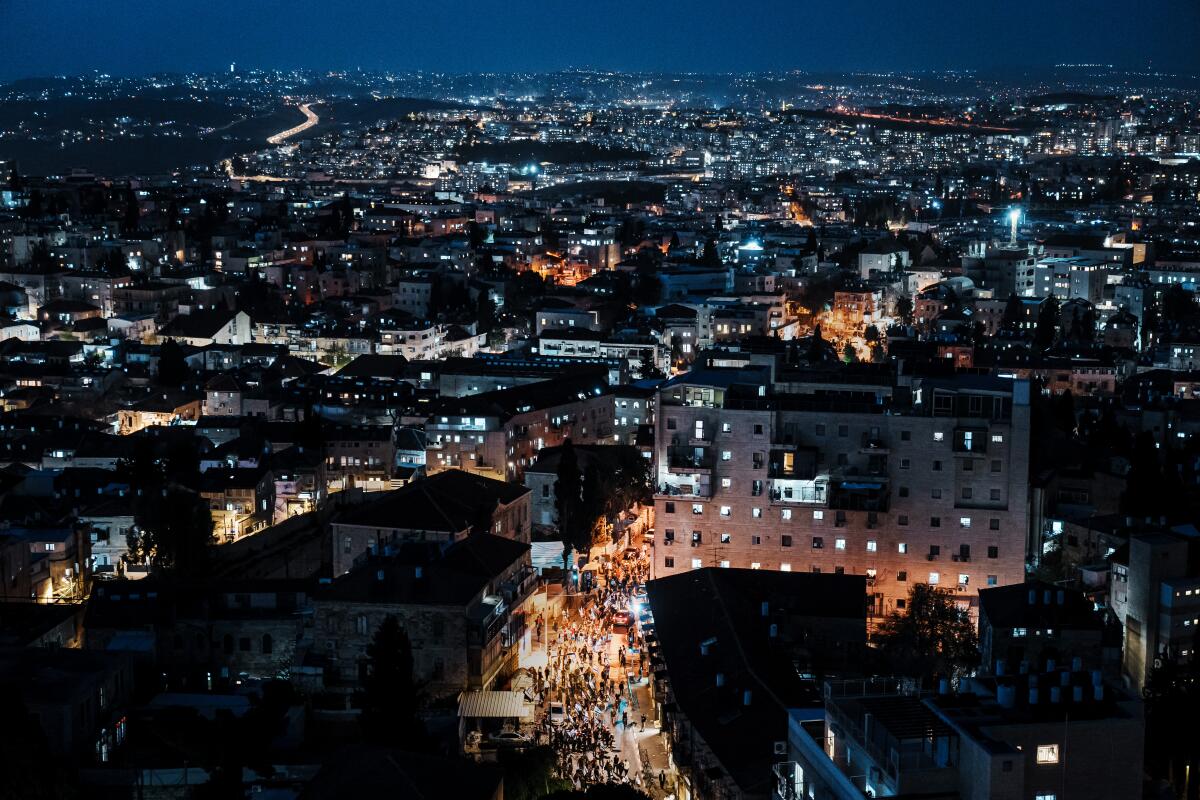
In a nationally televised speech before undergoing hernia surgery later Sunday, Netanyahu said he understood families’ pain. But he said calling new elections — in what he described as a moment before victory — would paralyze Israel for six to eight months and stall the hostage talks. For now, his governing coalition appears to remain firmly intact.
Some hostage families agree that now is not the time for elections.
“I don’t think that changing the prime minister now is what will advance and help my son to come home,” Sheli Shem Tov, whose son Omer was kidnapped from a music festival, told Israel’s Channel 12. “To go to elections now will just push to the side the most burning issue, which is to return the hostages home.”
The march and rally were part of pro-Palestinian demonstrations held across the country and around the world on Saturday.
In his Sunday address, Netanyahu also repeated his vow for a military ground offensive in Rafah, the southern Gaza city where more than half of the territory’s population of 2.3 million now shelters after fleeing fighting elsewhere. “There is no victory without going into Rafah,” he said, adding that U.S. pressure would not deter him. Israel’s military says Hamas battalions remain there.
In another reminder of Israel’s divisions, a group of reservists and retired officers demonstrated in an ultra-Orthodox neighborhood.
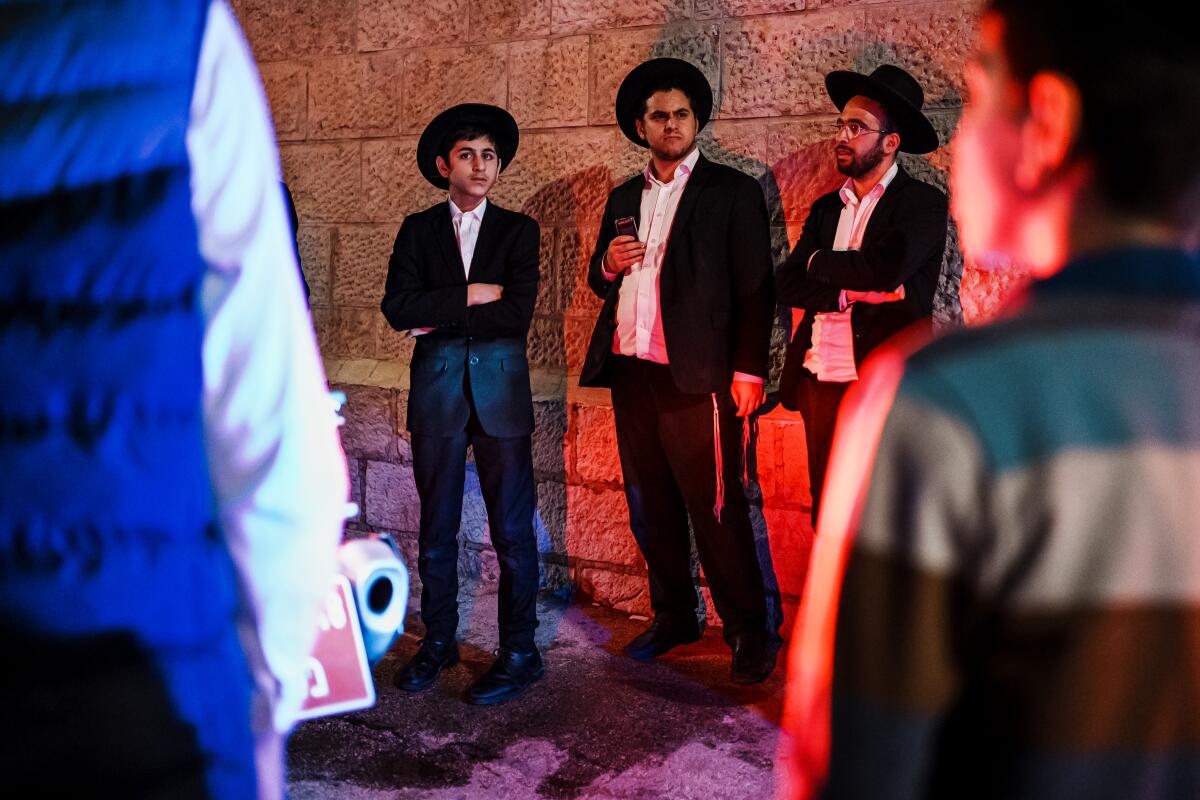
Ultra-Orthodox men for generations have received exemptions from military service, which is compulsory for most Jewish men and women. Resentment over that has deepened during the war. Netanyahu’s government has been ordered to present a new plan for a more equitable draft law by Monday.
Netanyahu, who relies heavily on the support of ultra-Orthodox parties, has asked for an extension.
The Bank of Israel said Sunday in its annual report that there could be economic damage if large numbers of ultra-Orthodox men continue not to serve in Israel’s military.
Tens of thousands of protesters have marched on the main highway into Jerusalem in a last-ditch show of force aimed at blocking Prime Minister Benjamin Netanyahu’s contentious judicial overhaul plan.
Also Sunday, an Israeli airstrike hit a tent camp in the courtyard of a crowded hospital in central Gaza, killing two Palestinians and wounding an additional 15, including journalists working nearby.
An Associated Press reporter recorded the strike and aftermath at Al Aqsa Martyrs Hospital in Deir al Balah, where thousands of people have sheltered. The Israeli military said it struck a command center of the militant group Islamic Jihad.
Tens of thousands of people have sought shelter in Gaza’s hospitals, viewing them as relatively safe from airstrikes. Israel accuses Hamas and other militants of operating in and around medical facilities, which Gaza’s health officials deny.
Israeli troops have been raiding Shifa Hospital, Gaza’s largest, for nearly two weeks and say they have killed scores of fighters, including senior Hamas operatives. Gaza’s Health Ministry said more than 100 patients remain with no potable water and septic wounds, with doctors using plastic bags for gloves.
Israeli Prime Minister Benjamin Netanyahu fired his defense minister a day after Yoav Gallant called for a halt to an overhaul of Israel’s judiciary.
Not far from Shifa Hospital in Gaza City, dozens of members of Gaza’s tiny Palestinian Christian community gathered at the Holy Family Church to celebrate Easter, with incense wafting through the rare building that appeared untouched by war.
“We are here with sadness,” attendee Winnie Tarazi said. About 600 people shelter in the compound.
The United Nations and partners warn that devastated, largely isolated northern Gaza is at risk of famine. Humanitarian officials say that deliveries by sea and air are not enough and that Israel must allow far more aid by road. Egypt has said thousands of trucks are waiting.
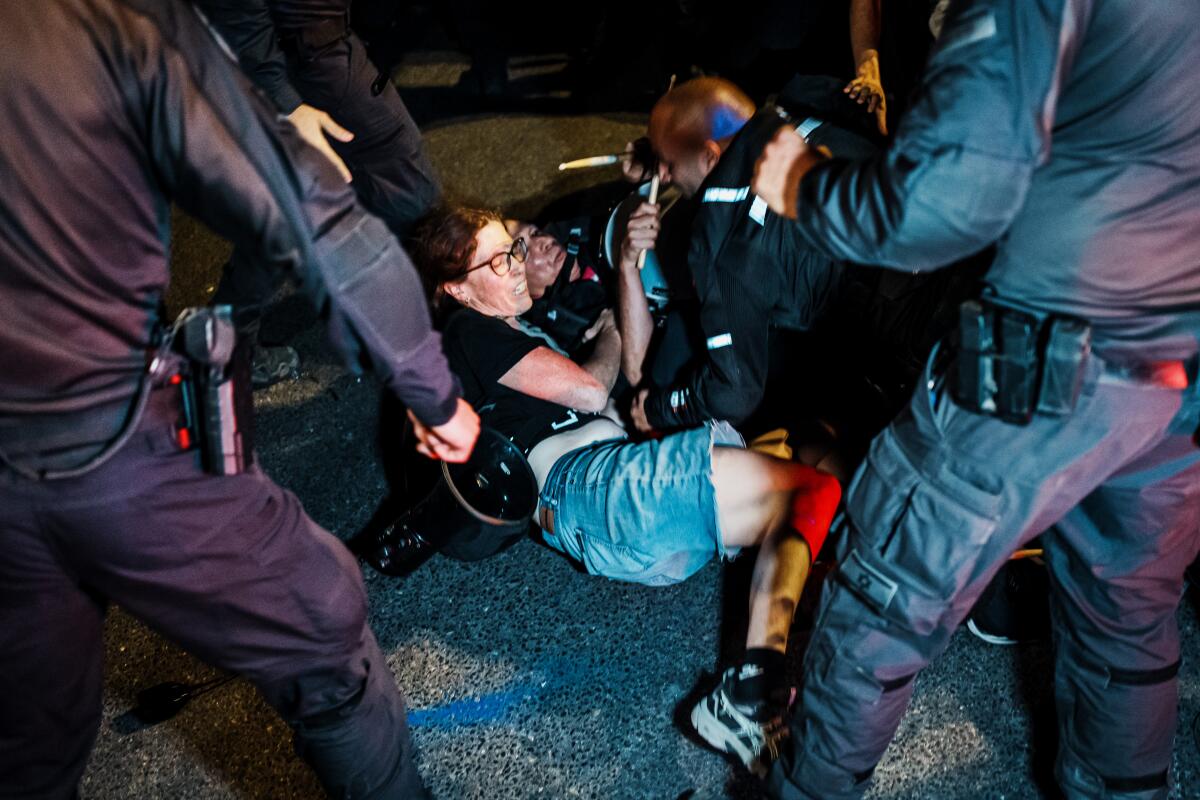
Israel says it places no limits on deliveries of humanitarian aid. It has blamed the U.N. and other international agencies for the failure to distribute more aid.
Gaza’s Health Ministry said Sunday that at least 32,782 Palestinians have been killed since the start of the war. The ministry’s count does not differentiate between civilians and fighters, but it has said that women and children make up around two-thirds of those killed.
Demonstrators blocked highways and gathered elsewhere in the latest nationwide protest against the Israeli government’s planned judicial overhaul.
Israel says over one-third of the dead are militants, though it has not provided evidence, and it blames Hamas for civilian casualties because the group operates in residential areas.
Amid concerns about a wider conflict in the region, Lebanese state media reported that an Israeli drone struck a car in the southern Lebanese town of Konin.
A Lebanese security official told the Associated Press that Hezbollah militant Ismail al-Zain was killed, speaking on condition of anonymity in line with regulations. Israel’s military called al-Zain a “significant commander.” Hezbollah confirmed the death.
Late Sunday, a Palestinian attacker stabbed three people in southern Israel, seriously wounding them, said the Hatzalah rescue service. Police said the attacker was shot, but gave no further details on his condition.
Lidman, Shurafa and Magdy write for the Associated Press. Magdy reported from Cairo and Shurafa from Deir al Balah. AP writer Kareem Chehayeb in Beirut contributed to this report.
More to Read
Sign up for Essential California
The most important California stories and recommendations in your inbox every morning.
You may occasionally receive promotional content from the Los Angeles Times.
